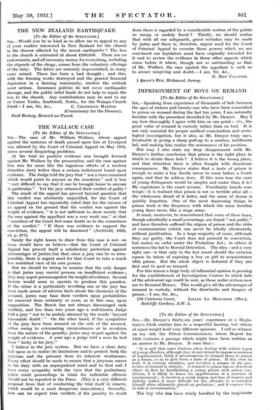IMPRISONMENT OF BOYS ON REMAND
[To the Editor of the SPECTATOR.]
Sm,—Speaking from experience of thousands of lads between the ages of sixteen and twenty-one who have been committed to prison on remand during the last ten years, I am naturally familiar with the procedure described by Mr. Denyer. May I say how thoroughly I agree with him on one point ; viz., the great value of remand in custody rather than on bail. It is not only essential for proper medical examination and socio- logical investigation, but is also, as Mr. Denyer truly says, invaluable in giving a sharp pull-up to a careless, indifferent lad, and making him realize the seriousness of his position.
But may I also state my deep disagreement with Mr. Denyer's further conclusion that prison is the right place in which to detain these lads ? I believe it is the wrong place, and that detention there is often fraught with disastrous consequences. Mr. Denyer states that a taste of prison is enough to make a boy decide never to come before a Court again, and that he seldom does. If this were true the cure of young delinquents would be simpler and easier than it is ! My experience is the exact reverse. Familiarity breeds con- tempt—it is realized that prison is not so terrible after all— the wholesome dread of it fades, and the sense of shame is quickly forgotten. One of the most depressing things in prison work is the frequency with which the same familiar young faces recur, like a stage army.
It must, moreover, be remembered that some of these boys, though admittedly a small percentage, are found " not guilty," and have therefore suffered the stigma of prison and the risks of contamination (which Can never be wholly eliminated), without justification. In a large majority of cases, although
they are guilty, the Court does not proceed to conviction, but makes an order under the Probation Act ; in others it
sentences the lad to Borstal Detention. The idea—and a very right one—is that only in the last resort should the extreme course be taken of exposing a boy or girl to acquaintance N./11th prison. But the whole object is defeated if they are first sent to gaol on remand.
For this reason a large body of influential opinion is pressing for the establishment of Investigation Centres to which lads of the adolescent age could be sent, as those under sixteen now are to Remand Homes. This would give all the advantages• of remand in custody, without the drawbacks and dangers of prison.—I am, Sir, &c.,






































 Previous page
Previous page